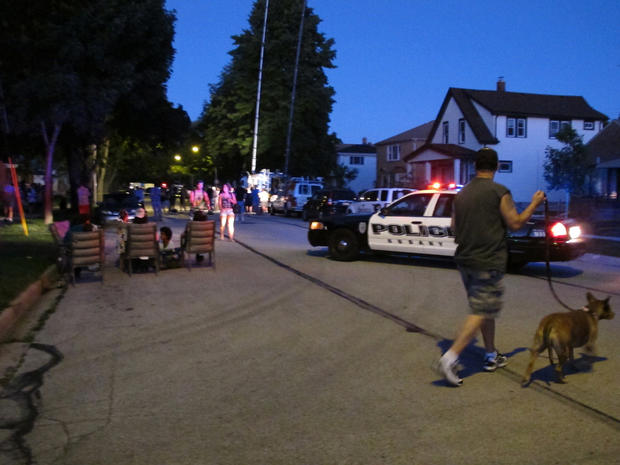Sikh Temple Shooting: Wade Michael Page, suspected gunman, kills 6 people in Wisconsin rampage, authorities say
(CBS/AP) OAK CREEK, Wis. - Authorities identified Wade Michael Page as the suspected gunman who launched a shooting rampage at a Sikh temple in suburban Milwaukee on Sunday, leaving six people dead and three others critically wounded in what police are calling an act of domestic terrorism. Wade was killed outside the temple in a shootout with police officers.
Officials had previously described the suspect as a heavy-set, 40-year-old Caucasian with numerous tattoos. No further details of a possible motive were provided nor suggested, including whether he specifically targeted the Sikh temple.
"He did not speak, he just began shooting," said Harpreet Singh, relaying a description of the attack from the wife of his uncle, temple president Satwant Singh Kaleka.
As worshippers prayed and meditated at the Sikh Temple of Wisconsin on Sunday morning, about a dozen women were preparing food in the temple kitchen for a meal after services which are open to community members, regardless of religious affiliation.
Singh said Satpal Kaleka told him she was in the front room when the shooter walked in. She said the 6-foot-tall bald white man -- who worshippers said they had never before seen at the temple -- seemed like he had a purpose and knew where he was going.
"We never thought this could happen to our community," said Devendar Nagra, 48, whose sister escaped injury by hiding as the gunman fired in the temple's kitchen. "We never did anything wrong to anyone."
Police, federal agents and the county sheriff's bomb squad swarmed a neighborhood late Sunday in nearby Cudahy, evacuating several homes and searched a duplex with warrants served at the gunman's home.
Oak Creek Police Chief John Edwards said police expected to release more information Monday. He said the FBI will lead the investigation because the shootings are being treated as domestic terrorism, an attack that originated inside the U.S.
"While the FBI is investigating whether this matter might be an act of domestic terrorism, no motive has been determined at this time," Teresa Carlson, Special Agent in Charge with the agency's Milwaukee division, said in a statement Sunday night.
A wounded officer who fatally shot the suspected shooter was in critical condition along with two other victims Sunday night, authorities said. Police said the officer was expected to survive. Tactical units went through the temple and found four people dead inside and two outside, in addition to the shooter.
Gurpreet Kaur, 24, of Oak Creek, said her mother was among a group of about 14 other women preparing a meal in the temple kitchen when the gunman entered and started firing. Kaur said her mother suffered what Kaur thought was shrapnel wound in her foot.
"These are people I've grown up with," she said. "They're like aunts and uncles to me. To see our community to go through something like this is numbing."
Kaur said she spent the afternoon serving as a translator between law enforcement and survivors at a nearby bowling alley. Police investigators kept witnesses inside the bowling alley's basement into the evening.
LeRon Bridges, 16, works at the bowling alley said police brought people from the temple over in two armored trucks. At one point, about 50 to 60 people were at the bowling alley, including police officers questioning witnesses and paramedics treating victims' wounds, he said.
Sikh rights groups have reported a rise in bias attacks since the Sept. 11, 2001, terrorist attacks. The Washington-based Sikh Coalition has reported more than 700 incidents in the U.S. since 9/11, which advocates blame on anti-Islamic sentiment. Sikhs are not Muslims, but their long beards and turbans often cause them to be mistaken for Muslims, advocates say.
Police in New York and Chicago issued statements saying they were giving Sikh temples in those cities additional attention as a precaution after the shooting.
Valarie Kaur, who chronicled violence against Sikh Americans in the 2006 documentary "Divided We Fall," said that even though the gunman's motives were a mystery Sunday, the shootings reopened wounds in a community whose members have found themselves frequent targets of hate-based attacks since Sept. 11.
"We are experiencing it as a hate crime," she said. "Every Sikh American today is hurting, grieving and afraid."
